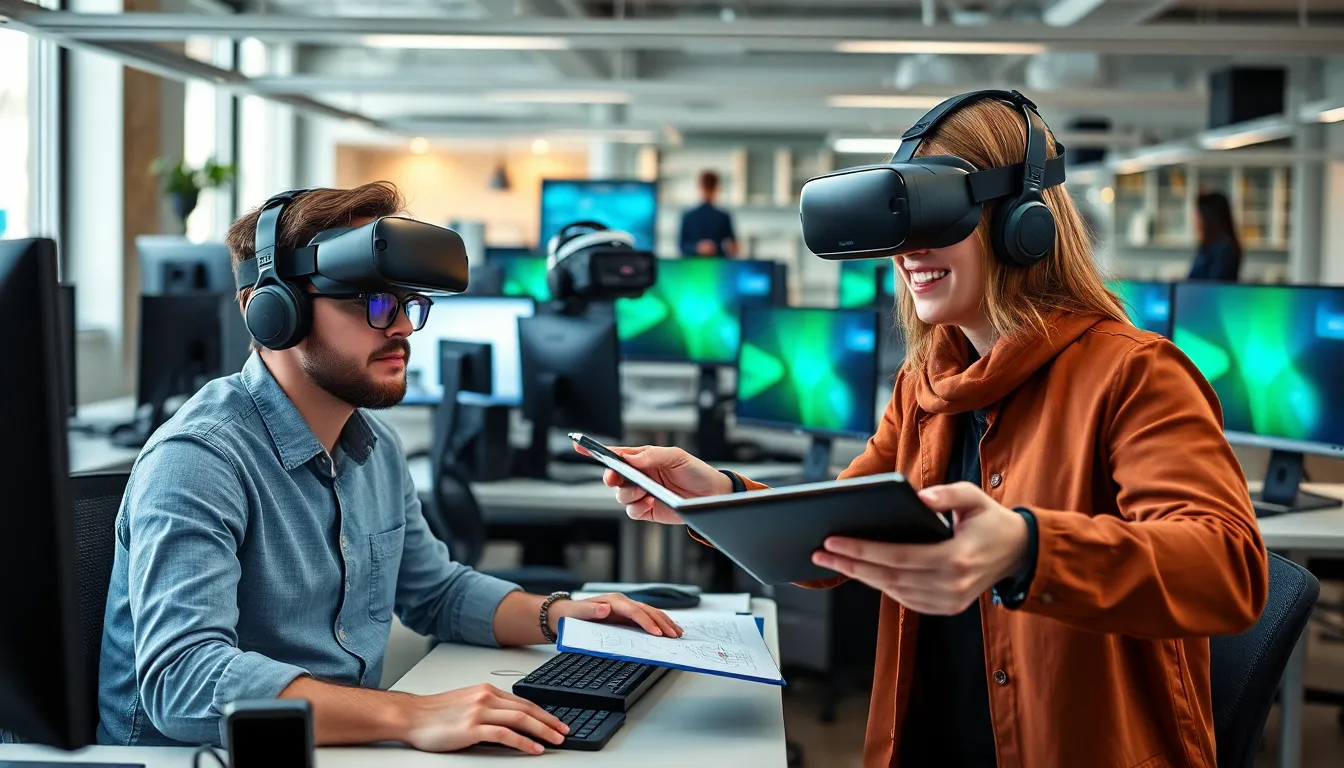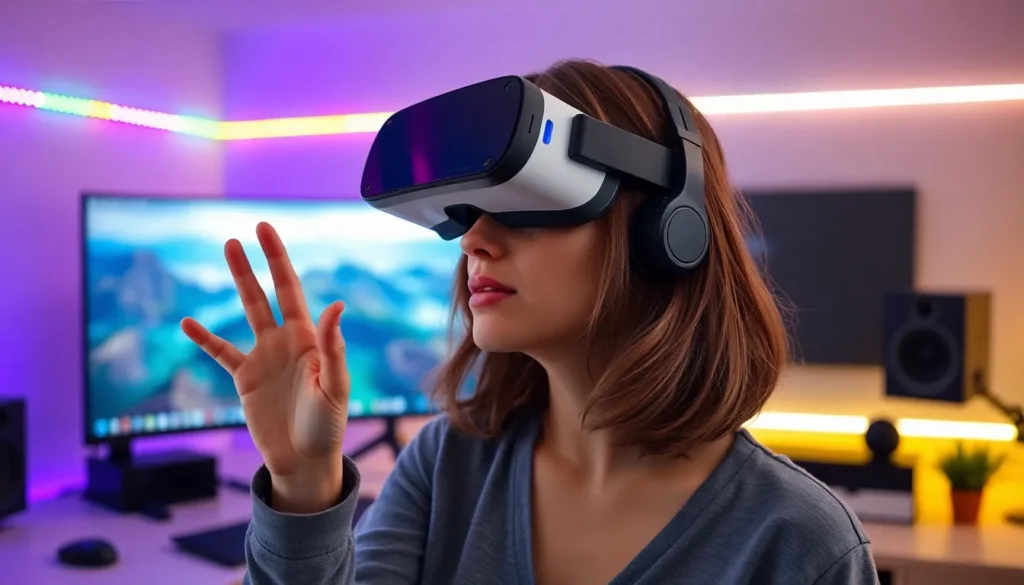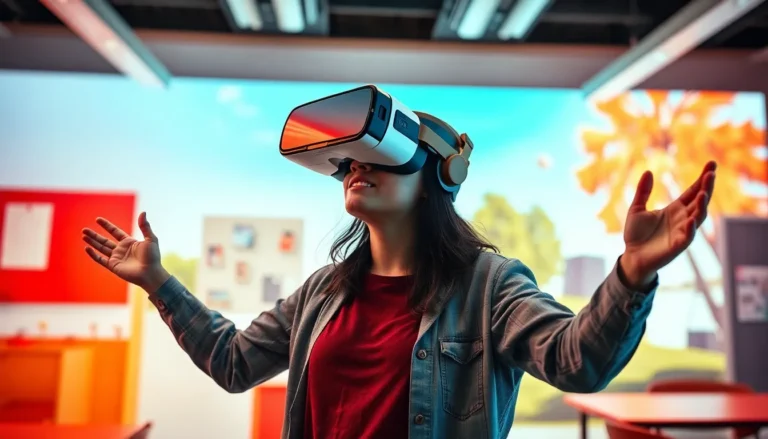Table of Contents
ToggleIn a world where reality sometimes feels a bit too… well, real, virtual reality jobs are stepping in to save the day. Imagine spending your workday exploring fantastical worlds, designing immersive experiences, or even training astronauts—all without leaving your couch. Sounds like a dream, right? Well, it’s not just a figment of imagination; it’s a booming industry that’s transforming how people work.
Overview of Virtual Reality Jobs
Virtual reality (VR) jobs encompass a wide range of roles that intersect technology and creative industries. Professionals engaged in these positions explore concepts in gaming, education, healthcare, and training simulations.
Game designers create interactive experiences that immerse users in fantastical environments. Their work often involves coding, storytelling, and visual artistry. In educational settings, VR specialists develop programs that enhance learning through simulations and virtual field trips. This approach allows students to engage with subjects like history and science interactively.
Healthcare also benefits from virtual reality jobs. Medical professionals use VR for surgery simulations and patient therapy. Skills learned in these environments translate effectively to real-world applications, improving patient outcomes.
Additional roles include VR developers who build the hardware and software that powers VR experiences. These experts require a strong foundation in programming languages like C++ or C#. Artists skilled in 3D modeling contribute to creating lifelike graphics, making virtual environments more realistic.
VR project managers oversee the development process. Their tasks involve coordinating teams, setting deadlines, and ensuring projects meet client specifications. They play a crucial role in aligning technical skills with creative vision.
Analysts assess market trends within the VR industry. By studying user feedback and behavioral data, they provide insights that guide future VR projects. These jobs emphasize data interpretation and strategic planning.
Locations for VR jobs vary widely, with opportunities available globally. Many positions offer remote work flexibility, allowing professionals to collaborate from different parts of the world. As the virtual reality sector continues to expand, the demand for diverse expertise in this field is increasingly vital.
Types of Virtual Reality Jobs

Virtual reality offers diverse job opportunities that blend technology and creativity. Various positions exist that cater to different skill sets and industry needs.
Game Development
Game development professionals design and build immersive experiences that captivate users. Developers utilize programming languages such as C++ and C# to create engaging gameplay mechanics. Graphic designers contribute stunning visuals that enhance the overall user experience. Additionally, sound designers craft audio that complements the immersive environment. Collaborating in teams fosters innovation and leads to groundbreaking VR games that capture players’ imaginations.
Simulation and Training
Simulation and training roles focus on creating realistic environments for educational and professional purposes. Specialists design VR training programs that help in fields like aviation, healthcare, and military operations. Developers incorporate realistic scenarios, enabling users to practice skills in a safe space. Instructional designers ensure that learning objectives align with the simulations to maximize efficacy. This combination of design and education transforms traditional training methods into dynamic learning experiences.
Virtual Reality Design
Virtual reality design encompasses a wide range of creative tasks. Designers create user interfaces that facilitate seamless interaction within VR applications. 3D modelers generate lifelike graphics that make virtual environments more relatable and engaging. User experience (UX) specialists analyze user behavior, refining designs for optimal navigation. As designers combine artistry with technological knowledge, they contribute significantly to immersive experiences that resonate with users.
Required Skills for Virtual Reality Jobs
Virtual reality jobs require a mix of technical and soft skills. Professionals looking to succeed in this dynamic field benefit from both areas of expertise.
Technical Skills
Proficiency in programming languages like C++ and C# facilitates game development and simulation creation. Familiarity with 3D modeling software, such as Blender or Maya, enables the design of realistic environments. Understanding VR hardware integration ensures seamless experience delivery. Familiarity with user interface design enhances accessibility and engagement. Knowledge of physics and spatial awareness plays a crucial role in creating immersive experiences. Analyzing and troubleshooting VR applications also helps improve functionality.
Soft Skills
Strong communication skills foster collaboration among team members, essential for project success. Creative thinking encourages innovative solutions and unique experiences. Adaptability allows professionals to keep pace with rapid technological advancements. Problem-solving abilities become critical when facing challenges during development or user testing. Empathy enhances user experience design by understanding user needs and behaviors. Time management helps meet project deadlines and deliver quality work efficiently.
The Future of Virtual Reality Jobs
The future of virtual reality jobs holds significant promise, driven by technological advancements and a growing demand for immersive experiences. As industries embrace VR, roles that blend creativity and technology are likely to expand. Game designers will continue to create engaging interactive experiences across multiple platforms, enhancing user interaction.
Additionally, VR specialists in education are set to develop innovative learning programs. These educational applications make learning more engaging and accessible for students of all ages. Healthcare professionals will increasingly incorporate VR into training simulations, allowing practitioners to refine their skills in a safe environment and improve patient outcomes.
Multiple positions will focus on both hardware and software development, including VR developers and 3D artists. These creators will design high-quality graphics and interfaces, ensuring user-friendly experiences. Project managers will play crucial roles in coordinating teams, guiding development processes, and managing timelines effectively.
Market analysts will gather and assess data, providing insights that shape future VR projects. As remote work becomes more prevalent, job opportunities in the VR sector will offer flexibility, attracting a diverse talent pool. Professionals skilled in programming languages such as C++ and C# are likely to be in high demand, alongside those proficient in 3D modeling software.
Future VR jobs will increasingly emphasize soft skills, including adaptability and creative thinking, as collaboration across disciplines becomes essential. User experience analysis will also remain critical as companies strive to craft captivating virtual environments that resonate with users. An emphasis on empathy in design will create more relatable experiences, ultimately enhancing user engagement in this dynamic landscape.
The landscape of virtual reality jobs is evolving rapidly, presenting exciting opportunities for those willing to embrace innovation. As industries increasingly integrate VR into their operations, the demand for skilled professionals will only grow.
Individuals with a blend of technical prowess and creative flair will find themselves at the forefront of this transformation. The potential for remote work adds an extra layer of appeal, making these roles accessible to a global talent pool.
With continuous advancements in technology and an ever-expanding array of applications, the future of work in virtual reality promises to be both dynamic and rewarding. Those ready to adapt and innovate will thrive in this immersive and engaging field.




